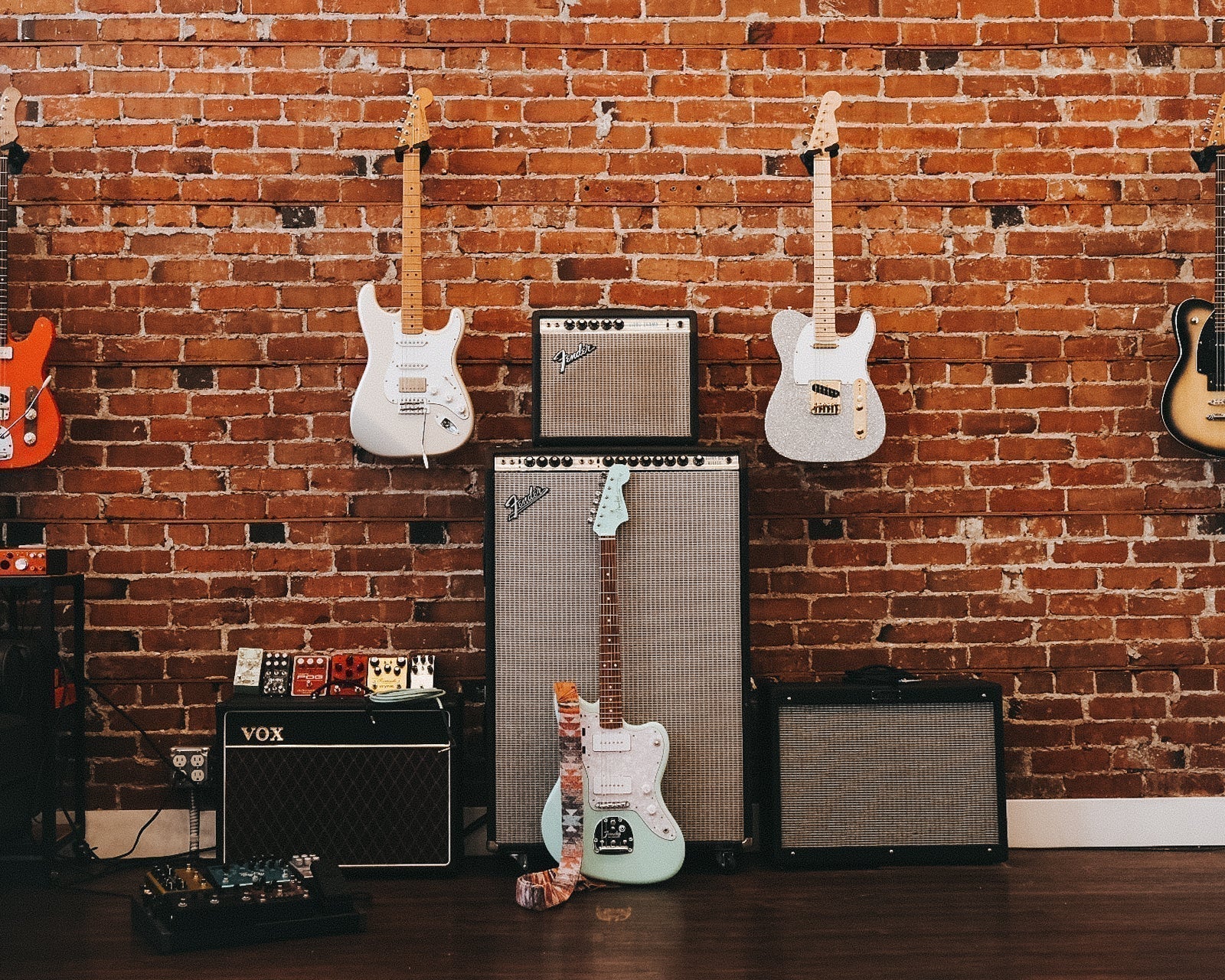Article: What Is A Good Electric Guitar For Beginners

What Is A Good Electric Guitar For Beginners
If you’re here, chances are you’ve either been bitten by the bug of playing guitar or you're buying for someone who has. Welcome! Playing guitar opens up a world of musical expression that’s rich, dynamic, and downright addictive. People love guitar players, too, so if popularity is part of the equation, this may just help solve it. And while guitars come in all shapes, sizes, and styles, getting started with an electric guitar is one of the most exciting ways to begin your journey. It can be as flashy or mellow as you’d like it to be, and flexible across just about any genre you could imagine.
But here’s the thing—getting started with the wrong gear can trip up a beginner fast. If your guitar is hard to play, poorly built, or just doesn’t sound great, it’s easy to lose interest. That’s why choosing the right first electric guitar matters more than most people think. And in this post, we’re breaking down exactly that. A roundup of what is a good electric guitar for beginners. These are the guitars we’d recommend to friends, family, or anyone looking to fall in love with making guitar tone for the first time.

What Is A Good Electric Guitar For Beginners
Before we dive into the list, let’s unpack what exactly we mean when we say "electric guitar," and how this guide can help you or someone you care about find a guitar that fits their style, goals, and budget. We’ll cover the basics about what makes electric guitars different, what to look for as a beginner, and which models stand out from the crowd in 2025. This is more than just a list, it’s a vetted roadmap into the world of electric guitars by folks to work on them and play them every day.
What Is An Electric Guitar
An electric guitar is a wooden body with strings that converts string vibrations into electrical signals using pickups, magnetic transducers mounted in the guitar's body. Those signals then get sent to a guitar amp, where they’re amp-lified and shaped into the tones you hear on your favorite records.
Unlike acoustic guitars, which produce sound through a hollow body, electric guitars rely heavily on the design of the pickups, electronics, and am circuitry to create a wide range of tones. Whether you’re going for clean, bluesy licks or gritty, high-gain rock riffs, an electric guitar opens up tonal possibilities that are not accessible for acoustic guitars. Features like a whammy bar, adjustable tone controls, or single coil pickups vs humbuckers can each add a different voice to your playing.

Is An Electric Guitar Good For Beginners
Absolutely. Beginner electric guitars are often easier to play than acoustics due to their slimmer necks, lower string action, and lighter string gauge. That means less finger fatigue and more time learning the fretboard.
When I was 10 years old, all I wanted to do was play the guitar, but my parents had me learning the piano instead. Finally, one Christmas, my parents gave me an acoustic guitar - but not just any acoustic guitar. It was one of those nylon string guitars that were of the lower-end quality spectrum with a wide neck, so it was impossible for my little fingers to press the strings down. This ruined my guitar-playing experience for a while, but when I finally saved up enough for my first electric guitar, it unlocked everything.
Electric guitars also allow beginners to explore various styles of music, from jazz to punk to pop and metal, without switching instruments. Add a good amp to the mix, and you’ll be able to experiment with clean tones, overdrive, and everything in between.
If you’ve ever asked, "do you need an amp for an electric guitar?", we answered that question in this post: Do You Need an Amp for an Electric Guitar. Short answer? Not always, but it's a whole lot more fun when you do.

How To Choose An Electric Guitar For Beginners
Comfort and Feel:
If you have smaller hands, look for a neck profile that is easy to wrap your hand around. Start with a C-shape, and if you don’t know how to identify that, ask the rep at the guitar store to help you. Also, start with a lightweight body. Make sure the guitar feels balanced whether you're sitting or standing. Les Paul’s or solid body Gretsch’s are probably not the way to go for the first one.
Versatility:
The best beginner electric guitars let you explore different genres. Guitars with both humbuckers and single coil pickups, or a combination of the two, offer more tonal flexibility. This is ideal when you're still figuring out what styles of music you love to play. If you had to choose one, start with single coils - and I’ll explain why a little later on in this post.
Build Quality:
Beginner guitars don’t need to be expensive, but they should be well-built. Pay attention to fretwork (run your finger down the edges of the neck where the frets are set and make sure there’s nothing sharp), tuning stability (nothing sucks the life out of rehearsing or playing when you have to stop and retune again), and the component quality. Crappy parts doesn’t mean you can’t get great tone, but it makes it harder to enjoy the process getting there.
Pickup Configuration:
Single coil pickups give you bright and punchy tones, great for all kinds of genre’s. Humbuckers (like the alnico classic pro or classic pro humbuckers that come in today’s Epiphone’s) provide thicker, warmer tones that work well for rock and heavier styles. The problem with entry-level guitars that come equipped with humbuckers is they are often muddy, dull, and dark sounding. Single coils are much brighter and cleaner in general, and we believe here at Lambertones that it’s easier to remove frequencies that are too present than it is to create missing ones that don’t exist. My personal favorite configuration is the “HSS” or humbucker single single, which is most common on a mid-grade Fender Stratocaster style guitar. The humbucker is in the bridge position (which helps keep some brightness and clarity) and the single coils are in the warmer middle and neck positions, so you’re getting the best of both worlds.
Price-to-Performance Ratio:
Spending more doesn’t always mean better. Some beginner electric guitars punch far above their price point. Others, not so much. We’ve handpicked models that deliver solid tone, feel, and durability without breaking the bank, and maybe a handful of ones to know about while you start saving up for guitar #2.
What Is A Good Beginner Electric Guitar

Yamaha Pacifica 112V - $300-$350
This guitar shows up on just about every beginner guitar list for a reason. The Yamaha Pacifica 112V delivers incredible value with my favorite versatile pickup setup! Single coil pickups in the neck and middle, plus a humbucker at the bridge. That HSS configuration makes it easy to play nearly any style of music.
Its alder body, maple neck, and rosewood fingerboard give it a classic feel, and the build quality is impressive for its price point. Add in a whammy bar for expressive playing, and it’s clear why this one’s a top choice.

Squier Classic Vibe '60s Stratocaster - $400-$450
If you're into vintage vibes like me, the Squier Classic Vibe series is the only choice. This S-style comes with three single coil pickups, a maple neck, and that iconic shape that is very comfortable to play sitting down or standing up.
It’s easy to play, sounds great clean or dirty, and carries the legacy of Fender without the hefty price tag. For a beginner electric guitar, it’s hard to beat this combination of tone and feel.

PRS SE CE 24 Standard - $500
A humbucker option that is no slouch. PRS makes some of the best playing and feeling guitars on the planet, and their SE-line is incredibly impressive for their beginner line. If you don’t care about the vintage vibe of a Les Paul, then the PRS is the way to go for its modern feel, playability, and affordability.
Stretch Goal Guitars
I like to have a couple options that are above, because you never know when the rich auntie is coming into town and wants to bless you with something nice, so it’s best to be prepared, am I right?

Fender Player II Strat or Tele - $700-$800
These are AWESOME. A genuinely high-quality instrument that you could tour with, the Player II series boasts the name, vibe, and quality to match. Beautiful fretwork and rolled edges, along with higher-quality electronics from the factory, make these a perfect foundation for your tone, from beginner to professional.

Yamaha Revstar - $850
Featuring chambered bodies (lighter), comfortable necks, and versatile tones, often inspired by classic designs like the Les Paul, usually have a 24.75" scale length and a comfortable C-shaped neck profile. They also have stainless steel frets, passive boost circuits, and decent stock pickups.

Charvel DK24 - $1100
We’ve graduated to very nice. This is more guitar than any touring professional would need, but for the price it MUST be on the list because it’s got all the goods for less than have of what a high-end Fender would cost (if you buy used), and plays and sounds better! Super comfortable S-style body, 12”-16” compound-radius fingerboard for super fast playability for all the scales you’re practicing right?? Gotoh trem and bridge system with stock high-end custom pickups. What’s not to love?!
Final Thoughts
There are literally thousands of guitars to sort though. So remember that choosing your first guitar isn’t about finding the "best," it’s about finding the right fit for you. These beginner electric guitars cover a wide range of tones, styles, and budgets, but they all have one thing in common, they help make it fun to play!
Don’t forget, your tone journey is just beginning. Pair your guitar with a decent amp, learn some basic guitar techniques, get a lesson with a qualified teacher who inspires you, and give yourself room to explore. Try not to buy with your eyes, because they do deceive - believe me! If you have a guitar store nearby, it would be in your best interest to spend some time in the guitar section, not even plugged into the amp, but just feeling the different styles, shapes, weights, all before plugging in to hear. Guitar pickups can almost always be changed later for a higher-quality sound, so don’t let the electronics be the final say on your first instrument. It needs to feel good above all else.
If you're still wondering what gear you'll need to get the most out of your setup, check out our post on do you need an amp for an electric guitar for a full breakdown, or if you’re interested in what quality electric guitar pickups could sound like in your new guitar you can check out our best seller models here! Enjoy that new guitar friend, and love your tone.


Leave a comment
This site is protected by hCaptcha and the hCaptcha Privacy Policy and Terms of Service apply.